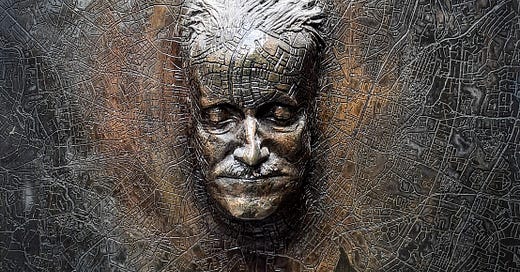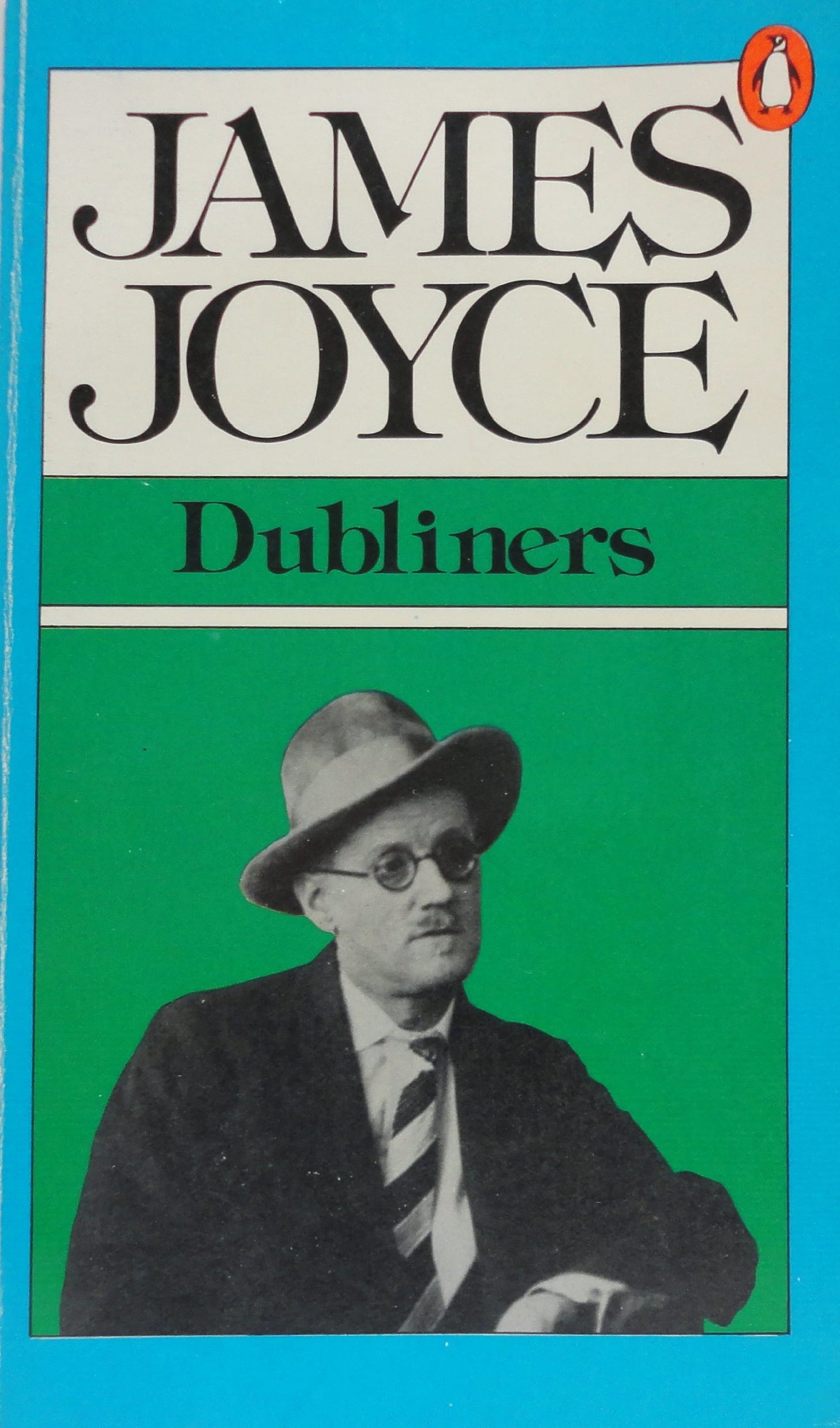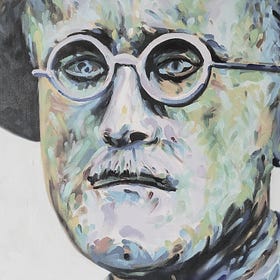Why I ❤️ James Joyce's "Dubliners"
The Books We ❤️ Club welcomes Dr. Kathleen Waller of The Matterhorn
Kate Waller has a special place in my heart, one of my earliest supporters and a dear friend who generously gives out equal measures of warmth and astonishing knowledge in her own newsletter,
.She has a podcast, is the author of two intense serial novels—A Hong Kong Story, and An Interpreter in Vienna (both available to read for free at the links)—and is currently working on bringing Matterhorn U. to life by building on her already impressive collection of posts centered on intertextuality in fiction.
I am delighted to present her article “Why I ❤️ James Joyce’s Dubliners” the first edition of the The Books We ❤️ Club—the book club you don’t actually have to read the book, leave the house, or even change out of your jammies to enjoy—as writers sing the praises of books that reach into our hearts.
You can read Dubliners free on Project Gutenberg.
We invite you to add your own reactions, insights, and ideas about Dubliners in the Comments for an impromptu book club session. Share your favorite quotes, characters, moments, and surprises in discussion with other passionate readers.
(And if you’d like to feature your favorite book in a future edition, DM me.)
The next edition of The Books We ❤️ Club will feature
and her take on Armistead Maupin’s Tales of the City.Why I ❤️ James Joyce's Dubliners
by
ofMr Duffy abhorred anything which betokened physical or mental disorder… He lived at a little distance from his body, regarding his own acts with doubtful side-glances.
--“A Painful Case,” Dubliners, James Joyce
It can be a painful and enlightening experience to realize that there are no answers in life. A chasm in the brain is left in the wake of explosion, waiting to be filled with either the complexities of the universe – swirling and questioning toward some kind of truth and beauty, however painful or satisfying – or some blocker, an opaque negation, a filler-of-a-fib we tell ourselves.
Literature both teaches us this mantra as well as giving us possibilities, ways to live. Fiction especially forces us to think, to reflect, and to be comfortable with the ambiguities and paradoxes that life creates. Transported to the parallel universes of fiction - new worlds, new perspectives - we can play with ideas and discover both who we are and how to live.
I was always a believer in this mindset: that there are rarely black and white answers or single conclusions. That one has to find one’s own way and even then, the path is constantly shifting and bifurcating. But it’s one thing to allow ambiguities and another to embrace it as the actual thing we are striving for.
This is what happened to me in an encounter with James Joyce. Not Ulysses, Finnegan’s Wake, or Portrait of the Artist as a Young Man, all of which I have been thoroughly perplexed by while still enjoying them immensely and all of which likely could have led to this same non-conclusion.
Instead, my transformational encounter was with Dubliners, Joyce’s collection of loosely joined short stories culminating in the novella The Dead (of which there is an excellent John Huston film adaptation, 1987).
Dubliners is both about Dublin and not. It’s about being an insider and outsider, about tradition and change. About exile and paralysis. About family and strangers. About religion and philosophy. In short, it is about reconciling those paradoxes of life and moving into a letting go of certainty.
Joyce wrote this collection starting in his early twenties with the full publication in 1914 when he was living in Trieste. This book contains seemingly simple stories framed as a deconstructed bildungsroman: coming of age stories organized as those of childhood, adolescence, maturity, and public life. However, the characters, anecdotes, and places (both of the city streets and its interiors) tell further stories through the multiplicity of layers we can delightfully navigate and ponder as readers.
Let’s start with something potentially more familiar. Have you ever noticed how a Robert Frost poem can nearly always be read in at least two distinct ways? Perhaps highlighting at once the inherent evil and goodness of humanity, or illustrating we are both at the mercy of fate and open to complete free will.
Take the ending from “Out, Out—" for example:
And they, since they / were not the one dead, turned to their affairs.
A boy dies in an accident involving a wild “buzz saw.” We are asked to question if the death of the boy matters at all. Of course it matters, but the return to daily life may either be celebrated as a way to go on and not dwell on tragedy or as the shallowness of others’ empathies, who lack the will to pause long enough to reflect on the stolen years and experiences as well as the sadness of his loved ones.
How can a great piece of literature be so vague? How can it fail to give us a road map of thought to be better people and create a better world? How can it fall short of explaining to us the way something works?
But of course, modern art and literature ask us to embrace just that: the ambiguity and nuances of truth, the unfixed concept of beauty.
Poststructuralists helped us understand the process of breaking down the barriers of oppositions and embracing the nuances that deconstructed dichotomies can produce for us in theories of deconstruction. I had studied these concepts at school and embraced philosophers like Jacques Derrida and Gilles Deleuze, but it had remained in the abstract, in the mental space of a university campus perhaps or the bulb of youthful discovery, until I began teaching James Joyce’s Dubliners.
I found myself doing my student teaching in Paris at the age of 22, nearly the same age as Joyce when he arrived there for medical school (which he wouldn’t finish). It was there, at the Lycée International, that I first encountered these stories with Scott, one of my mentor teachers, and his class of lively senior students.
Each story lesson became a kind of Socratic Seminar with focused questions related to style, character, or themes. These were highly engaged students, so each question – even if about stylistic features – became a lively debate.
In discussing the ensuing stories and considering focus areas, Scott and I realized we differed greatly in our interpretations of “Eveline,” the story of adolescence where Eveline recalls the strange death of her mother, reflects on living with the “violence” of her father and taking care of two young siblings, and looks out onto the street as she considers the paralysis in Dublin, or in modern life. With fatigue at this life, she ponders her choices whilst breathing in “dusty cretonne,” as if the particles in the domestic space are suffocating her.
But Eveline does have a choice. Frank, a sailor, has convinced her to come to Buenos Aires with him, secretly escaping the repetition of her days. But does he offer her freedom in a new land, an exciting adventure, or is it a further trap of domesticity and alienation? They barely know each other, and yet, he is so insistent on her departure with him, speaking in brief exclamations: “Come!” and “Eveline! Evvy!” Eveline concludes, just in time perhaps, that “he would drown her.” She feels as if she is being taken prisoner:
All the seas of the world tumbled about her heart. He was drawing her into them….
She also concludes that she neither loves him nor really knows him.
The story might be read just as Frost’s “The Road Not Taken.” Should Eveline take the road less traveled by, despite the lack of love for Frank? Would it make a positive difference or a tragic one? Perhaps, instead, this experience opens up nineteen-year-old Eveline to the possibilities that are out there. It need not be this one. Or, a way to live in Dublin, her home with a mix of sad and beautiful memories.
The answer is, of course, unclear. But the revelation for me was in being able to sit with both extremely different solutions without choosing. This is what my mentor Scott and I demonstrated for the students through a modelled debate.
Joyce said he wrote this volume of stories because “Dublin seemed to [him] the center of paralysis.” He claims to write in a “style of scrupulous meanness.” One might even consider a kind of self-loathing through the treatment of the place of his origin.
But the book is also filled with love for Dublin and those who inhabit it, despite the tensions. How else could he write such a beautiful book? The melancholic nature of many scenes, the missed chances and early deaths – these elements perhaps only heighten our awareness that there is something magical in this homeplace for Joyce, something that as an exile for most of his adult life, he perhaps simultaneously longed for.
The stories show influences of foreignness in Dublin, which seems to have intrigued Joyce from a young age. The “Italians” make several appearances, characters represent nations in “After the Race,” and “Eastern enchantment” is at the center of “Araby.” It is in the bazaar in “Araby” that the child narrator finds himself disoriented by the strangeness of new cultures and the thoughts of what money can buy:
Gazing up into the darkness I saw myself a creature driven and derided by vanity; and my eyes burned with anguish and anger.
Is this not Joyce as an expatriate, wondering what has taken him away from home? Perhaps this is my projection, for I am in my eighteenth year of life in foreign countries.
Over the years, I have found students respond exceptionally well to these stories and take comfort in the strange, ambiguous nature of the text. A wonderful group of students in Hong Kong were moved by the tale of unrequited love and missed chances in “A Painful Case,” thereby naming their rock band after it. Others in several locations created pastiche to reflect their own complex relationships with the cities they called home, often in anticipation of a near departure for university in a foreign land.
The culminating novella of this collection, The Dead, brings together many of the themes of the earlier stories. The protagonist, Gabriel, is often likened to Joyce but also has religious symbolic significance as the archangel sent to announce God’s will to humanity.
Through the Epiphany gathering of extended family and friends, we allow human weakness to exist in an accepting and loving community. An old relative who lacks musical ability is encouraged to play for the party. An alcoholic man who is a burden for his elderly mother is also shown to be kind-hearted and even wise at times. A secret of the past is eventually accepted with humility rather than spurned through jealousy.
There are further unclarities about Joyce’s feelings toward religion, speaking Irish and the National cause, and working as a writer. These are investigated through different characters’ perspectives, like dichotomies portrayed in many other fictions.
The way Joyce is able to infuse his writing with such strength of love, disdain, joy, jealousy, fear, and hope – all working in conjunction – makes the experience of reading this collection a life-changing experience. It feels like something other-worldly, as if Joyce has connected us to the universe beyond, collapsing even the distinguishing features between life and death.
His ending depicts Gabriel looking out into falling snow through “generous tears” as he considers the real meaning of life in an epiphany:
His soul swooned slowly as he heard the snow falling faintly through the universe and faintly falling, like the descent of their last end, upon all the living and the dead.
Change is invisible. Sure, we can see things that happen to us – the way our homes or families or jobs shift, if we reach certain pedestals or milestones. We can also share parts of our identities in visible ways. But the way we experience the world is an internal mystery, one that literature helps us to investigate.

The Book of Dublin
Just back from 8 days in Dublin, which originally was supposed to be just three, with additional days in perhaps Galway and Cork, but as we started to examine Things To Do in those second cities we realized that they were not perhaps as attractive to us as we’d initially thought—not that The Butter Museum doesn’t have a special allure,…












Thank you so much for this treatment of "Dubliners" Kate - I had never read it, but picked up a copy of the Collins Classics edition while I was in Dublin, the least expensive of the available (and the smallest to pack). Imagine my surprise at the number of typos! 😂 More on the unsigned introduction in a moment.
The story that spoke to me most, and the one you mentioned first - "A Painful Case" - which is indeed painful, no less for Mr. Duffy (maybe) as for the tragic Mrs. Sinico. I really felt for her on reading this line:
[Captain Sinico] "had dismissed his wife so sincerely from his gallery of pleasures that he did not suspect that anyone else would take an interest in her."
What a horrible predicament to find herself in, unloved by her husband at a time when divorce was impossible. And no wonder that when she meets Mr. Duffy, who seems to have so many common interests in music and books, she finds herself enamored of this "confirmed" bachelor willing to share his time with her.
I've read suggestions that, of course, Mr. Duffy is queer and closeted. The evidence is everywhere.
He writes in his papers: "Love between man and man is impossible because there must not be sexual intercourse and friendship between man and woman is impossible because there must be sexual intercourse." What more obvious declaration could there be in a story written in 1905, just 10 years after Joyce's countryman Oscar Wilde's trial and imprisonment? Even more interesting is how Mr. Duffy wanders into Phoenix Park at night and happens upon a scene of clandestine carnal relations which even today is known for gay cruising (according to the internet... ;)
I wonder why Joyce would write so openly about a gay man in his debut collection? Our tour guide on the James Joyce's Dublin walking tour said that Joyce was at odds with his time, his country and even his religion over many things: he was not a Romantic, and wanted to look to the future, not back to an idealized Irish past which ultimately led to the successful independence movement; he lived with Nora Barnacle for 27 years and had two children before marrying her, an affront to Catholicism; he had a somewhat libertine youth, and may have contracted syphilis in a brothel.
Maybe he was an early champion of "the love that dare not speak its name" - or any unsanctioned pursuit of happiness - while it was still quite virulently prosecuted? Hard to say; but some of the final lines of "A Painful Case" certainly echo with a loneliness and despair familiar to many queer people - he even repeats one of them twice.
"He gnawed the rectitude of his life; he felt that he had been outcast from life's feast ... No one wanted him; he was outcast from life's feast ... He felt that he was alone." So sad.
But back to the unsigned Collins Classics introduction - I wish they'd given attribution because I'd like to see what else the writer has said about Joyce. Here are some interesting lines:
"Some scholars describe "Dubliners" as a panoply of the city's society, but in truth it feels more like Joyce was finding his feet as a writer." Well. Nothing wrong with that - every writer has to start somewhere, and I suppose I can salute an editor who dares to suggest that Joyce was a man, not a literary god. They go on:
"Initially publishers could see that his work wasn't accomplished enough for their readership, but eventually he learnt to turn his limitations into a distinct style. In fact "A Portrait of the Artist as a Young Man" was a rewrite of a manuscript he had failed to publish a decade before, and "Dubliners" suffered a similar publishing history, having originally been completed in 1906 . It's a curious thing, but nowadays Joyce is celebrated as an important literary genius and influence, with the suggestion that he struggled to get published because he was ahead of his time, rather than because he needed to mature as a writer."
LOVE some good literary sacrilege. 😂😉🤪
"Transported to the parallel universes of fiction - new worlds, new perspectives - we can play with ideas and discover both who we are and how to live." Nicely put, Kate. It's a while since I read the whole collection of stories and you make me want to go back to it. Thank you for celebrating the openness of texts like Eveline. It's how we need to learn to read the world.